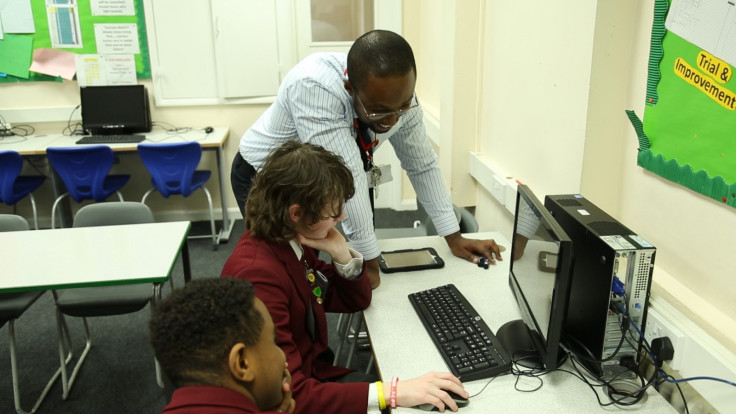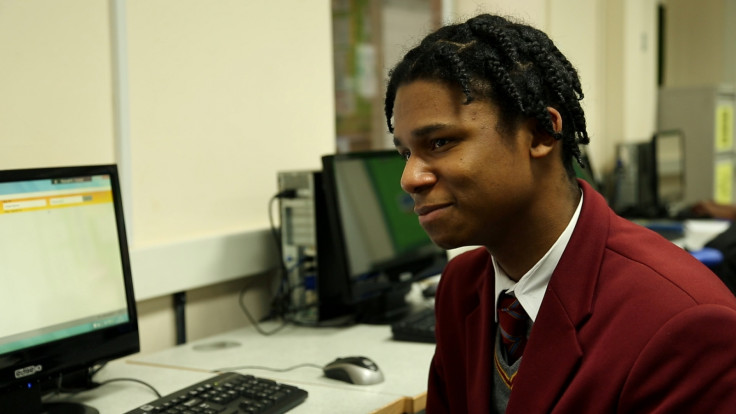Coding in the classroom: How has the UK curriculum overhaul fared six months on?
In September 2014, the biggest upheaval for 14 years to the UK national curriculum took place. Schools across England and Wales replaced the subject of Information and Communications Technology (ICT) with Computing, with one of the core components of this being the teaching of coding in the classroom.
Six months may be too soon to see if it can be considered a success but it's enough time to judge how well the new programmes of study have been integrated and accepted by both teachers and students alike.
'Computing is cool'
A common point of contention for both teachers and those within the IT industry was that the skills taught through ICT were outdated, uninspiring and increasingly irrelevant for future employment.

"[Computing] certainly helps to fill a need and certainly a kind of skill shortfall that we had before in the IT industry," Ben Gould-Elia, a computing teacher at St Thomas the Apostle College in Peckham, told IBTimes UK. Gould-Elia believes that the "soft skills" taught through ICT, such as creating PowerPoint presentations and Excel spreadsheets, have limited use in the ever-evolving IT industry and were failing to equip students for the world of work.
Students at the school have apparently responded positively to the new curriculum and are already seeing the practical use of learning these new skills.
"Computing is a lot different because there are so many cool things you can do," a Year 11 student said. "With ICT all you have to do is basically 'learn this' and 'learn that', but computing is 'when you learn this and learn that you can put your knowledge all together into one and make a program that works'. It's cool."
One student has even gone so far as to develop his own social network in his spare time, with the hope of launching it later this year. When asked if he thought it could be as big as Facebook, he replied: "Bigger".
Three R's and a C
The inclusion of coding into the new computing curriculum was one of the main changes that the Department of Education claimed would "ensure every child leaves school prepared for life in modern Britain."

"I think learning to code is an important skill for everyone going through school now. It's now embedded in our lives," former Minister of State for Schools Lord Jim Knight told IBTimes UK.
"If we are going to prosper in work, then even if we're not going to be coders - very few people are going to be coders - there's a whole range of skills that if you're going to really prosper in this economy, you need to understand the basics of how the whole thing's put together."
This view of coding as a core skill is one shared by David Miller from London-based games studio Kuato, whose Hakitzu game teaches coding to children through robot hacker battles. While their focus on education may mean it's not the future of gaming, Kuato's games could offer a glimpse into the future of learning.
On a recent visit to Kuato, Miller told IBTimes UK that coding should be considered as important as reading, writing and arithmetic due to its fundamental importance in the digital world we are now living in.
"For us coding is very important because it is in a sense the fourth literacy and it should be almost seen as a language that cuts across subjects," Miller said. "Children who have some level of understanding of how the digital world works will have a much more productive work life."
Computing certainly helps to fill a need and certainly a kind of skill shortfall that we had before in the IT industry.
'Most teachers aren't happy teaching computing'
One of the biggest challenges with introducing such a seismic change to the curriculum has been making sure that teachers are adequately prepared. Lord Knight claims that after years of ICT, with coding some teachers "just don't know how to do it."
In the same month that the new computing programmes of study were rolled out across schools in England and Wales, a YouGov study found that only 15% of teachers are "totally computer savvy".
Of the 1,009 teachers polled, only 40% said they were "good enough to do what I need to do", reflecting criticism from some teachers that there has not been enough training for teachers unfamiliar with this technology.
"[It's difficult] unless you've got a degree in computer science or something relevant; most teachers have a university degree or they did teaching at university. The nature of the particular subject like computing, there's quite a lot of terminology and specifics that you need to know, so most teachers aren't happy teaching it," Peter Feldon, a PE and computing teacher at Woodford Green Primary School in London, told IBTimes UK.

Pupils teaching computing classes
Feldon suggests that teachers of a certain age generally lack the fundamental background knowledge to ever be truly comfortable teaching things like coding, and risk getting left behind by the more tech-savvy students.
Indeed one student at St Thomas the Apostle College revealed that there had been some instances where the pupils had taught the lessons.
It will be more than a decade before five-year-olds complete the full curriculum but its success should be able to be judged in just a few years.
"I'd say we'd probably need to wait three or four years," Lord Knight said. "I don't think you'll need to wait until a five-year-old is 16 and then has gone into the labour market. You need three or four years to see quite how confident the teachers are then... See how both employers and universities are responding to the earliest entrants coming out of school. Then we'll be in a fair position."
© Copyright IBTimes 2025. All rights reserved.






















